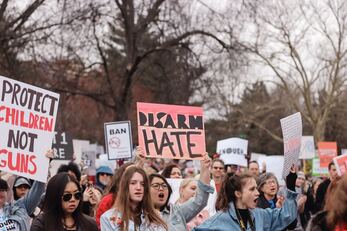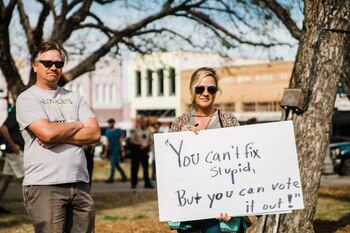|
Just Because Our Politicians Don’t Have the Political Will Doesn’t Mean We Should Give Up  Photo by annie bolin on Unsplash Photo by annie bolin on Unsplash On Saturday afternoon, I woke up on my front porch from an unplanned but welcome nap. The zen of my unexpected slumber quickly disappeared after I saw the news of yet another mass shooting from El Paso. I sent a paranoid and panicked message to my friends who live there, and they thankful confirmed their safety in minutes. Then, I stomped around the house, angry that these shootings continue to happen, and discouraged because I feel so helpless to affect change on this issue. The cycle repeated itself the next morning when I woke up to the news of the Dayton shooting. Two in less than 24 hours. I watched all the Sunday morning news shows hoping maybe this time would be different, but expecting the rhetoric to be the same.  Photo by Heather Mount on Unsplash Photo by Heather Mount on Unsplash Unfortunately, the talking heads did not disappoint, and I grew more frustrated. A day later, the death toll is at 31, and Facebook is filled with posts about who to blame. My mind reels with ideas about how I can “help” find a solution, and like most issues, I come back to the same three actions on how to make the most difference. 1. Support candidates who will #TaketheMoneyOut of politics .Moving to small-donor, publicly-funded elections is the best way to “fix” most of our political problems. Eliminating the legal bribery of our politicians by PACs, corporations, and the uber-rich will level the playing field so the voices of “regular” voters can be heard again. This would not only keep the NRA from stopping gun control legislation but help with healthcare reform, climate change, and voters’ rights laws as well. A bonus of this change is it increases the diversity of our representative because candidates don’t have to be economically “comfortable” to run for office. The devil on my shoulder snickers, warning me that this is a long-term solution. It will take multiple election cycles of supporting reform candidates because current lawmakers won’t vote to cut themselves off from the bribery. I begrudgingly respect his point and consider more immediate actions. 2. Contact your elected officials and tell them to pass ‘red flag’ gun laws, strengthen background checks, and disarm domestic abusers and the mentally ill.The public supports these issues in most polls. And in-person meetings are the most effective way to influence your representative. Right now, members of Congress are on August break, so do the research and find out what local picnic, parade, or town hall they are attending. If that isn’t possible, call, fax, or email instead. There is no consensus on which is best; one poll says email is the most effective, an ex-staffer says calling, and I use resistbot. Whichever you choose, simply contact your representatives, identify yourself as a constituent, be specific about your request, be polite, and don’t use social media to communicate. The devil on my shoulder scoffs, telling me that Newtown, Parkland, and Charleston didn’t change anything, “So why bother?” I remind the devil there are two reasons to keep up the pressure. First, the House flipped in 2018 and the NRA has less influence over the party in control. Second, you should always bother. Call me optimistic, naive, whatever, but we live in a democracy. When we give up our voice and “stop bothering,” we give up any chance of getting what we want — what a heavy majority of the country wants. 3. Don’t forget about your local officials, and bring your neighbor to the polls. Focusing on local change is crucial because it’s more manageable to work with your neighbors to find a compromise than it is negotiating with the neighbors of 50 states. Although state laws cannot go against federal laws, they can strengthen them. In addition, many times, federal law is modeled on local ordinances that proved successful. Finally, political change, especially on a topic as polarizing as gun control is a marathon, not a sprint. The typical path to Congress starts in a local school board, city council, or state legislature. As a result, our federal laws are heavily influenced by who we elected at the local level ten years ago. Since we cannot go back in time, we can only protect our futures by electing more local officials who share our values now. But voter turnout for local elections in the U.S. is as low as 14% in some cities. We need to increase voter turnout locally to affect societal change in the future. The upcoming year will bring primaries for state and federal races, so be sure to ask candidates about campaign finance reform, vote, and bring your neighbor along. The devil on my shoulder is finally silent. Re-motivated to act, I look up where my local chapter of the League of Women voters meets this month. I will start on Saturday, at 10 a.m. ---- Originally published on Medium.com.
0 Comments
Your comment will be posted after it is approved.
Leave a Reply. |
annisa's blogIncludes professional topics, as well as thoughts about politics. I also keep a blog on Medium that includes these, as well as more personal posts. archives
January 2020
categories
All
|

 RSS Feed
RSS Feed